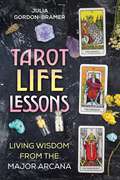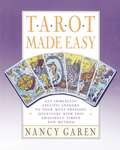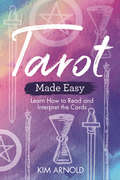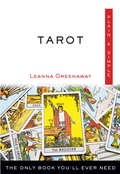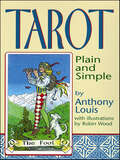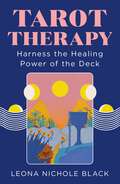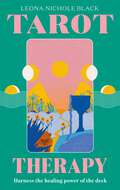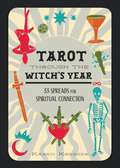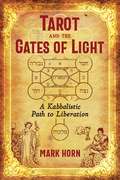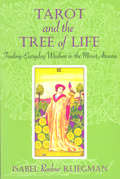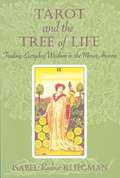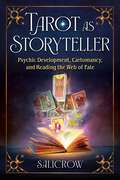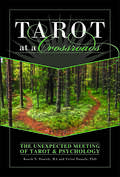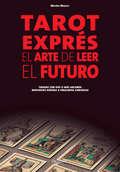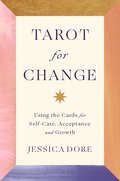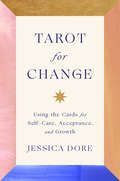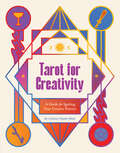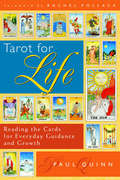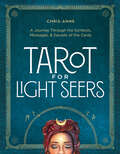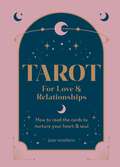- Table View
- List View
Tarot Life Lessons: Living Wisdom from the Major Arcana
by Julia Gordon-BramerReal-life stories using the Tarot as a tool of insight and self-transformation• Explores the living wisdom of the Tarot, based on the author&’s more than 40 years&’ experience as a professional Tarot reader • Shares stories from the author&’s client readings to show how each card tells a story and how it only takes a small amount of familiarity to decipher a world full of meaning in the cards • Shows how to use the Tarot to grow your strengths, identify your weaknesses, conquer problems, and move on from painful situations As Julia Gordon-Bramer reveals in profound detail, the miracle of Tarot is how the right cards show up, time and time again, to provide guidance or symbolically illustrate your story—whether you believe in the Tarot or not. In these real-life tales of Tarot wisdom, Gordon-Bramer explores the modern applications and the living wisdom of the Tarot, based on her more than 40 years&’ experience as a professional Tarot reader. Sharing stories from client readings and her own spiritual journey, she shows how to intuitively, logically, and sometimes playfully glean the meaning of each card that appears and integrate its powerful spiritual lessons for deeper understanding, guidance, and personal healing. She compares reading the Tarot to dream analysis, explaining how the Major Arcana, such as The Fool, The Magician, The Lovers, or The Star, represent the key players and milestones in life, the sacred adventure from birth to death. She explains how each card tells its own story, often revealing subconscious beliefs and motivations through its colors, numbers, symbols, and pictures, yet she also reveals how it only takes a small amount of familiarity to decipher a world full of meaning in the cards. Allowing you to make the leap from an abstract understanding of the Tarot to actually working intuitively with the cards, this book shows how, when used as a life-transforming tool to awaken and tame the subconscious, the Tarot offers a way to grow your strengths, identify your weaknesses, and conquer problems as you journey through life.
Tarot Made Easy: Get Immediate, Specific Answers To Your Most Pressing Questions With This Amazingly Simple New Method
by Nancy GarenHere is a real breakthrough in interpreting the tarot! If you've ever been intrigued by the tarot but were confounded by the complexities of multi-card spreads and the vague interpretations given in most books, this is the guide for you. With Tarot Made Easy you can easily interpret the meaning of any card and apply it to the particular circumstances of your life. With the simple process outlined here, you need only choose one tarot card and then consult one (or several) of the 32 categories listed under each card -- including Romance, Travel, Career, Finances, Friends, and Special Guidance -- to discover the card's specific message for you. For example, if you want to know about your romantic future and the Queen of Cups turns up, you may find that the standard description given is "an honest, devoted woman; loving intelligence and happiness." How should you interpret this? But with Tarot Made Easy, the Queen of Cups Romance category tells you that "someone will enter your life in whom you will be very interested...and you will meet this person very close to your home, if not outside your front door." This easy but accurate system banishes the vague interpretations found in most books and gives you the immediate, specific insights you need.
Tarot Made Easy: Learn How to Read and Interpret the Cards
by Kim ArnoldA fascinating book that reveals the ancient craft of tarot and offers detailed guidance on how to conduct readings of your ownThis book teaches the reader how to connect with the time-honoured wisdom and spiritual power of the tarot and make major decisions - just by turning a card. Author and tarot expert Kim Arnold teaches using the Rider Waite tarot, which is acknowledged as the classic deck to begin understanding this ancient system. Ideal for first-time users of tarot cards, this book includes guidance on: - Choosing the right deck for you- Interpreting each of the 22 Major Arcana and 56 Minor Arcana cards- A variety of different spreads and techniques for weaving together the cards when you do a reading for yourself and others- Ways to meditate on the cards and go deeper into their messagesThis title was previously published within the Hay House Basics series.
Tarot Plain & Simple: The Only Book You'll Ever Need (Plain & Simple Series)
by Leanna GreenawayTarot is a popular form of divination that has been used for centuries. By following the guidelines set out in this book, you will come to understand how easy it is to master the art of reading cards. Many people struggle with the many different tarot books available today—they can be difficult for the novice to follow, and many present differing interpretations of the cards. This guide brings tarot into the 21st century, making the card meanings relevant and easy to understand and follow. <P><P>Tarot Plain & Simple offers modern and up-to-date interpretations for all 78 cards. Once you know these basics, you'll be able to easily branch out into more advanced and complex tarot books. Throughout this plain and simple book, the author discusses various card groups for interpretation, focusing mainly on the Celtic cross spread.
Tarot Plain and Simple
by Anthony LouisTarot Plain and Simple by Anthony Louis is the book you've been waiting for! As the title indicates, this book presents the Tarot in clear language that anyone can understand. If you've had trouble learning the Tarot, this book gives the meaning of each and every one of the 78 Tarot cards—both in simple terms and in-depth ones, both upright interpretations and those for when a card is drawn reversed. Illustrations are from the elegant and mystic Robin Wood Tarot.This book leaves nothing out! It includes an overview of the history of the Tarot and suggests why this divinatory method works from a scientific point of view. It even includes several spreads and example readings. That way you can see exactly how the Tarot works, how the cards play off of each other and how to give a reading.Turn to any page and see how you can learn meanings and interpretations. The Five of Cups shows a cloaked person with head down and three of five cups knocked over, spilling their contents. Upright the card means "mourning." But the key words and phrases give you so much more. It can also mean regret, sadness, loss of trust, an emotional letdown, betrayal in love, and much more. How can you tell which expression best fits the card? It depends upon where it falls in the spread and the cards that surround or lead up to it. This is explained in the clear but comprehensive section on Tarot card spreads, and is illustrated in the sample readings.If you have been waiting for an ideal book to help you learn the Tarot, this is it. The longer you wait, the longer it will be before you can give effective Tarot readings. Get out that Tarot deck and get this book today!
Tarot Therapy: Harness the Healing Power of the Deck
by Leona Nichole BlackBring connection and purpose to your life through the wisdom of tarotTarot Therapy is practical toolkit for understanding your life more fully through the wisdom ofthe tarot. Tarot therapist Leona Nichole Black, guides readers through every aspect of dailylife—from love and relationships, to careers and social impact—using the major arcana a sourceof inspiration and guidance. The process is intuitive and immersive, a unique and powerful wayof finding mental clarity, processing life experiences, and giving voice and language to youremotions.Throughout Tarot Therapy you’ll find personalized prompts, meditations, and tarot spreads thatwill empower you to:- Read the map of your life's journey- Hear the wisdom of your inner-voice- Take time to heal and grow- Make life-changing decisions- Reveal your talents to the worldTarot Therapy is a reflective guide that will help you deepen and strengthen your mostimportant relationship—the one you have with yourself.
Tarot Therapy: Harness the healing power of the deck
by Leona Nichole BlackUse the wisdom of tarot to transform your life Established tarot therapist Leona Nichole Black helps us find the answers to the questions and problems that life presents us with, using the wisdom of tarot. Written so that readers can work through the book with or without a deck, Tarot Therapy covers eight areas of life:The impact of LOVEHow we find PURPOSELearning how to HEALCoping with CHANGEFinding our TRUTHThe power of HOPEEmbracing our INTUITIONChannelling CREATIVITYWith beautiful illustrations and prompts to help you reflect on what you've learnt and better understand your own experiences, this is a practical, personal and inspiring companion for both beginners and experienced tarot readers.
Tarot Through the Witch's Year: 33 Spreads for Spiritual Connection
by Karen KrebserExplore the spiritual patterns of the Tarot with this collection of spreads based on the pagan Wheel of the Year. Reflecting earth-honoring spiritualities, Tarot Through the Witch's Year presents divination in a welcoming, inclusive, non-judgmental, and informative way. Readers, novice and proficient alike, are invited to dive headfirst into the spirituality involved in the witch&’s year and to approach divine energy as it moves us and the Great Wheel around. The thirty-three spreads include layouts, images, diagrams, and sample readings for the four equinoxes and solstices, the four cross-quarter days, thirteen full moons, and twelve dark moons. Readers in both the Northern and Southern Hemispheres will find valuable insight and tools as they navigate their year, beginning at any point on the calendar. See your year through new eyes, finding deeper meanings and a greater sense of connectedness.
Tarot and the Gates of Light: A Kabbalistic Path to Liberation
by Mark HornAn innovative, spiritual workbook that integrates the Tarot and the Kabbalistic tradition of Counting the Omer • Explores the origins and meaning of the 49-day Kabbalistic meditative practice of Counting the Omer and how it can lead to spiritual revelation, personal insight, and connection with the Divine • Reveals the correspondence of the Tarot&’s minor arcana with the Sephirot of the Tree of Life and explains how both relate to the Omer meditation • Provides a daily practice workbook that explores the related Sephirot and Tarot cards for each day, examines their Kabbalistic and spiritual meanings, and provides questions for daily reflection and meditation guidance The 49-day mystical practice known as Counting the Omer is an ancient Jewish ritual observed between the holidays of Passover and Shavuot (also known as Pentecost). As practiced by Kabbalists, it is designed to cleanse and purify the soul in preparation for spiritual revelation and a personal connection with God. The ritual creates a spiritual inner journey that follows the path of the ancient Israelites from the moment of their physical freedom from slavery in Egypt to the establishment of their spiritual freedom forty-nine days later when they arrived at Mt. Sinai. Adeptly integrating this mystical practice with the transformative symbolism of the Tarot, Mark Horn uses the ritual of Counting the Omer as a template for a guided meditative practice that gives readers insight into their personal life journey and help in overcoming the issues that hinder their growth and spiritual awakening. Examining the correspondence of the Tarot&’s minor arcana with the Sephirot of the Kabbalistic Tree of Life, he shows how using the cards in connection with Counting the Omer can unlock the gates to a deep experience of the sacred. In the detailed daily practice workbook section, Horn provides day-by-day descriptions of the 49-day meditative practice of Counting the Omer. He divides the journey into seven week-long segments, which in turn are broken down into seven daily practices. For each day, he explains the related Sephirot and Tarot cards and their Kabbalistic and spiritual meanings, providing the reader with questions for daily reflection, guidance for meditation, and insight from traditional Jewish texts as well as teachings from Christian, Buddhist, Hindu, and Muslim traditions. Unveiling the relationship between Tarot and the Kabbalah, Horn shows readers how uniting these two practices can open them to a deeper experience of the Divine.
Tarot and the Tree of Life
by Isabel Radow KliegmanThough many books are available on the 22 major Tarot cards, few look in depth at the 56 Minor Arcana, or suit cards. Simple, accessible, and easy to understand, these "overlooked mirrors" of everyday life can help us access our inner knowing and learn more about ourselves. In refreshingly down-to-earth terms and with a joyous, commonsense wisdom, Kliegman demystifies the Tarot by revealing its "small secrets."
Tarot and the Tree of Life
by Isabel Radow KliegmanThough many books are available on the 22 major Tarot cards, few look in depth at the 56 Minor Arcana, or suit cards. Simple, accessible, and easy to understand, these "overlooked mirrors" of everyday life can help us access our inner knowing and learn more about ourselves. In refreshingly down-to-earth terms and with a joyous, commonsense wisdom, Kliegman demystifies the Tarot by revealing its "small secrets."
Tarot and the Tree of Life: Finding Everyday Wisdom in the Minor Arcana
by Isabel Radow KliegmanSince most books studying tarot focus primarily on the Major Arcana cards, this book focuses exclusively on the Minor Arcana cards--the number and court cards of each of the four suits. Kliegman gives good information about possible interpretations of each card both in its upright and reversed positions, and provides additional insight by drawing correlations between each card and the Tree of Life. She also provides interpretive information drawn from Jungian psychology.
Tarot as Storyteller: Psychic Development, Cartomancy, and Reading the Web of Fate
by Salicrow• Explores cartomancy as psychic storytelling, outlining techniques to develop intuition, psychic ability, and analytical questioning• Explains how to look deeply at the symbolic pictures each card provides and open your mind to the tale being told through your intuition• Shows how to interpret each card&’s symbolism through activated prayer, spell work, and guided journeys that introduce readers to the Major Arcana as personal experiencesIn this guide to the art of cartomancy, psychic medium Salicrow shows novice and seasoned practitioners alike how to read divination cards with greater accuracy and more profound insight. She shares practices to help you develop psychic ability—including empathic protection, body dowsing, utilizing sacred space, and divine timing—and how to build your own personal symbolic language. She offers techniques for developing intuition and analytical questioning, providing a clearer picture of the players, situations, and details, and thereby encouraging you to take on the role of storyteller by looking deeply into the symbols and tales that each card holds.Expanding the concept of each card&’s symbolism, Salicrow explores the meanings of tarot and oracle cards through activated prayer, spell work, and guided journeys that introduce the Major Arcana as personal experiences. She also shows how to pick a deck, cleanse and bless the cards, and properly store them, and she presents many spreads that look at relationships, career guidance, and healing.Through her insightful teachings, Salicrow demonstrates that card reading enhances the connection between intuition and imagination. With each reading, your storytelling ability will grow, as will your inner knowing for how to ask better questions.
Tarot at a Crossroads: The Unexpected Meeting of Tarot & Psychology
by Victor Daniels Kooch N. DanielsJourney through a unique Tarot resource that presents thought-provoking methods to help bridge the worlds between Tarot readers and psychology counselors, psychotherapists, personal coaches, and healers. Convey depth and incisiveness to both tarot readings and therapeutic sessions by making them more engaging and useful. Find out how to give “representational readings” and learn to select cards that represent issues with others or within the reader. Discover a technique of laying cards in “emotional stacks” that can be used in both readings and counseling sessions to view what lies beneath the surface of consciousness, and then gain knowledge of how to open realms of new possibilities. You will encounter blended traditional symbolic Tarot coupled with modern psychological practices that integrate the use of visual imagery via distinctive tools and approaches. Develop a broader psychological background, new methods, and insights for your Tarot readings.
Tarot exprés
by Michele Mazily¿Me voy a cambiar de casa? ¿Me van a ascender? ¿Voy a casarme con X? ¿Me voy a ir de vacaciones?... Piense intensamente en la pregunta formulada, baraje las cartas y empiece a concentrarse en el corte, pues va a obtener la primera respuesta con tan sólo dos tiradas. Esta es la esencia del funcionamiento del tarot exprés. Un modo sencillo y rápido de dar respuesta a preguntas claras y precisas que cada día nos planteamos acerca de la salud, el dinero, el amor... y que la experta en tarot Michèle Mazilly describe en este práctico libro para aquellos que comienzan en el mundo de la cartomancia. El tarot exprés se ha convertido en un elemento indispensable que nos guía en nuestra vida cotidiana, por lo que se convierte en una herramienta perfecta y accesible para desarrollar la intuición en todos los ámbitos. Michèle Mazilly, astróloga y experta en tarot desde hace años, ha sabido, con el paso del tiempo, conjugar sus dos pasiones. Especialmente intuitiva desde su infancia, el mundo de los astros y el tarot se imponen de forma natural en su vida. Cada año da conferencias y cursos, y, además, organiza talleres y seminarios.
Tarot for Beginners: A Holistic Guide to Using the Tarot for Personal Growth and Self Development
by Meg HayertzLearn tarot to reveal a story of personal growthWhen you unlock the meanings of the tarot, and apply it to the patterns and experiences in your day, you will begin to see what you couldn't before. Tarot for Beginners will open you up to intuition, bring you greater confidence in facing life's challenges, and lead you to reach new levels of awareness.This accessible guide helps beginners learn how to read a tarot deck, and provides techniques for relating abstract archetypes and symbols in the cards to concrete details in your life.Inside this easy-to-use beginner's book, you'll find:A welcoming environment—A positive, open space to learn the basics of tarot, and the hows and whys, written with passion and care.Tarot demystified—This simple-to-understand, well-written resource takes the perceived complexities of tarot, and brings it down to earth.Easy how-tos—Quickly pick up how to select, use, and care for your deck. Learn the structure of the deck, and how to state questions and arrange card spreads.Full descriptions of the cards—Thorough and informative, historical and insightful, the book explores and interprets the physical as well as the symbolic aspects of the tarot.Heighten your awareness and grow into the life you want with Tarot for Beginners.
Tarot for Change: Using the Cards for Self-Care, Acceptance and Growth
by Jessica DoreUnlock the transformative power of tarot with this unique investigation into the psychology of its secrets, symbols and stories.Symbols have been used in modern psychology for generations, from the interpretation of fairy tales to inkblot tests. Though tarot is often thought of as a tool for divination and fortune-telling, it too contains a set of symbols that hold the potential to unlock secrets of the human experience, from the esoteric to everyday life. With beautiful illustrations based on the traditional Rider-Waite deck, this book will inspire you, awaken your curiosity and show you how to cultivate a deep connection with the cards.In Tarot for Change, Jessica Dore divulges profound insights about how to work with tarot to better understand ourselves and live in alignment with our life values. You'll discover:· The importance of choosing the right deck and how to find it· How the mythic imagery of tarot supports evidence-based therapeutic concepts such as mindfulness and acceptance· The skill of interpreting specific images and symbols· How to build a meaningful relationship with the cardsJessica's reflections on each of the 78 cards weave together ideas from the fields of psychology, behavioural science, spirituality and old stories, breathing new language into ancient wisdoms about what it means to be human.
Tarot for Change: Using the Cards for Self-Care, Acceptance, and Growth
by Jessica DoreThough tarot is often thought of as a tool for divination and fortune-telling, it also has deep roots in spirituality and psychology. For those who know how to see and listen, the cards hold the potential to help us better navigate the full spectrum of the human experience.In Tarot for Change, Jessica Dore divulges years of hard-won secrets about how to work with tarot to better understand ourselves and live in alignment with what&’s precious. Dore shows readers how to choose a deck, interpret images, and build a relationship with the cards, while also demonstrating how the mythic imagery of tarot supports modern therapeutic concepts like mindfulness, acceptance, and compassion. Her reflections on each of the seventy-eight cards are a vibrant tapestry that weaves together ideas from psychology, behavioral science, spirituality, and old stories, breathing new language into ancient wisdoms about what it means to be human. This is as much a book for those who are new to tarot as it is for those who have worked with the cards for years. And it's a book for anyone interested in exploring what it means to experience joy, heartbreak, wonder, stagnation, grief, loneliness, love. A book of secrets, symbols, and stories, Tarot for Change is a charm for remembering that our problems are not new, we are never alone, and whether we know it or not, we are always in a process of change.
Tarot for Creativity: A Guide for Igniting Your Creative Practice
by Chelsey Pippin MizziTarot isn’t just for divination—it’s also a great way to connect to your creativity. Discover how tarot can help you stay inspired and make your best work with this practical guidebook.For modern mystics of any level—from the seasoned cartomancer to the total novice—Tarot for Creativity offers a fresh take on the rich tradition of the tarot. In this unique and practical guide, tarot reader and creativity coach Chelsey Pippin Mizzi explores each of the standard 78 tarot cards and provides an accessible explanation of how their symbols and archetypes relate to creativity, four prompts to encourage creative experimentation and self-discovery, and a spread to help you integrate each card's message into your work. These thoughtful entries are accompanied by vibrant contemporary artwork from the Modern Way Tarot deck, created by J. Bindels and illustrated by N. Fernando. Whether you're a writer, artist, engineer, chef, or influencer, this guidebook offers down-to-earth advice for honing your voice, overcoming blocks, and cultivating your creative magic.A NEW APPROACH TO TAROT: Whether you're an experienced practitioner or a new initiate, Tarot for Creativity invites you to explore tarot as a form of storytelling and self-reflection that can yield abundant creative and personal growth. WE ARE ALL CREATIVE: All humans are creative. But that doesn’t mean great ideas come easily. Drawing on her experience as a tarot reader and creativity coach, Chelsey Pippin Mizzi teaches us to tap into our imagination, overcome blocks, and deepen our relationship with our creativity, all using tarot as a powerful tool. COMBINES WITH ANY TAROT DECK: Tarot for Creativity can be combined with any tarot card deck to add a new dimension to your practice. Use it with your favorite set, or gift it to a creative friend alongside a deck that speaks to their personality, from a classic Rider-Waite tarot deck to modern favorites like Mystic Mondays Tarot or Cat Tarot.Perfect for: Tarot and oracle card lovers of all experience levels Artists and writers of all ages Working and aspiring creatives, including bloggers, designers, and entrepreneurs Hobbyists who want to experiment with and nurture a creative practice Anyone interested in self-care and personal growth
Tarot for Every Day: Ideas for Bringing Tarot Wisdom into Your Daily Life
by Kate JohnsonThe author gives basic information about use of tarot cards for beginners. She then suggests a variety of correspondences between the cards and scents, foods, colors and herbs. Interesting uses of the cards are also suggested for healing meditations and dreams. The primary concept being promoted, is that if you really want to become familiar with tarot, then you really need to incorporate it into your daily life instead of just bringing it out on serious occasions.
Tarot for Life
by Rachel Pollack Paul QuinnPaul Quinn transforms the Tarot from fortune-telling into the ultimate self-help tool for intuitive guidance, empowerment, and well-being. Discover how to apply the Tarot, as a lifelong resource, to access inner wisdom and gain deeper insights and practical, inspired guidance in relationships, career, family, and personal growth. With illustrations from the Universal Waite deck, the book offers 78 engaging casebook examples (one for each card) from Quinn's readings for clients. Drawing on Jungian psychology, the Hindu chakras, and other esoteric traditions, he explains how the Tarot can reveal unconscious patterns and offer soul-directed advice leading to positive changes and greater well-being. Quinn also provides guidelines on reading the cards for oneself and others, interpreting reversed cards, handling difficult disclosures, and psychic self-care.
Tarot for Life
by Rachel Pollack Paul QuinnPaul Quinn transforms the Tarot from fortune-telling into the ultimate self-help tool for intuitive guidance, empowerment, and well-being. Discover how to apply the Tarot, as a lifelong resource, to access inner wisdom and gain deeper insights and practical, inspired guidance in relationships, career, family, and personal growth. With illustrations from the Universal Waite deck, the book offers 78 engaging casebook examples (one for each card) from Quinn's readings for clients. Drawing on Jungian psychology, the Hindu chakras, and other esoteric traditions, he explains how the Tarot can reveal unconscious patterns and offer soul-directed advice leading to positive changes and greater well-being. Quinn also provides guidelines on reading the cards for oneself and others, interpreting reversed cards, handling difficult disclosures, and psychic self-care.
Tarot for Light Seers: A Journey Through the Symbols, Messages, & Secrets of the Cards
by Chris-AnneWith in-depth messages, prompts, and spreads in a playful, bright full-color format, this book is an expansion of The Light Seer&’s Tarot guidebook, offering readers a guide to reading tarot from the optimistic perspective of a Light Seer.ARE YOU READY TO TRAVEL THE SUNSHINE AND SHADOW PATH OF THE LIGHT SEER?This book will expand the guidebook of The Light Seer&’s Tarot—a deck which has shipped nearly 250K copies since late 2019 and has nearly 19K reviews on Amazon—from a 20K word "little white book" to a fully realized tarot-readers guide filled with interpretations, keywords, prompts, and spreads in a playful, bright, four-color format.Taking a deep dive into the symbolism woven through the illustrations on each card and pointing out the traditional Rider-Waite-Smith imagery that inspired the contemporary artwork, this book will feature a breakdown of the symbolism on each card and share the traditional card art for comparison.Explore this collection of dreams, archetypes, and stories as you walk the path of darkness and sunshine, living the lessons and channeling the messages of the Light Seer. The relatable, contemporary characters will allow you to easily and intuitively translate the message of the cards, and as you connect with their magic they will become trusted guides that will bring you to your own inner landscapes and knowing.
Tarot for Love & Relationships: How to read the cards to nurture your heart & soul
by Jane StruthersRelationships are fundamental to our quality of life and we strive to understand them and make them better. The tarot persuades us to look deeply and more carefully at every aspect of both our love and our work relationships.In both our love lives and work relationships, tarot readings can instil a sense of deeper understanding and more careful consideration. Whether you feel let down by your best friend, stuck in a stagnant relationship, or sensing friction at work the Tarot can be a powerful tool for making decisions.From the triumphs to the heartbreaks, it can help us to assess current situations or future events with extraordinary accuracy, and its 78 cards allow it to cover a huge variety of possibilities. Tarot for Love & Relationships includes sample readings using both classic spreads and new arrangements, and illustrated with the classic Rider Waite deck, this is a complete guide to navigating relationships with the Tarot.
Tarot for Love & Relationships: How to read the cards to nurture your heart & soul
by Jane StruthersRelationships are fundamental to our quality of life and we strive to understand them and make them better. The tarot persuades us to look deeply and more carefully at every aspect of both our love and our work relationships.In both our love lives and work relationships, tarot readings can instil a sense of deeper understanding and more careful consideration. Whether you feel let down by your best friend, stuck in a stagnant relationship, or sensing friction at work the Tarot can be a powerful tool for making decisions.From the triumphs to the heartbreaks, it can help us to assess current situations or future events with extraordinary accuracy, and its 78 cards allow it to cover a huge variety of possibilities. Tarot for Love & Relationships includes sample readings using both classic spreads and new arrangements, and illustrated with the classic Rider Waite deck, this is a complete guide to navigating relationships with the Tarot.
